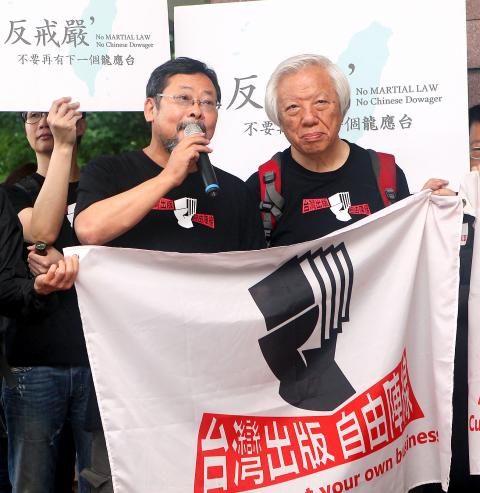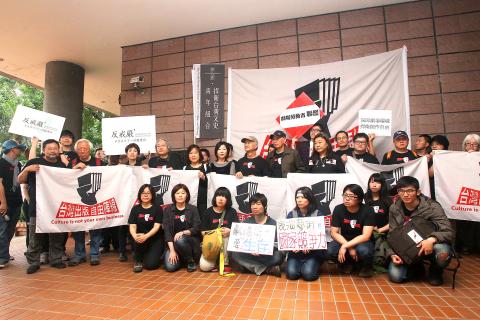|
Culture minister urged to protect sector’s workers
CROSS-STRAIT THREAT: TFPF members say the creative industries have been hurt by low salaries and increased outsourcing and the service pact would cause more harm
By Alison Hsiao / Staff reporter

Musician Chen Ming-chang speaks yesterday as members of the Front for a Free Press in Taiwan hold up signs during an International Workers’ Day demonstration in Taipei.
Photo: Hu Shun-hsiang, Taipei Times

Front for a Free Press in Taiwan members yesterday hold up banners and signs during a protest to mark International Workers’ Day in Taipei.
Photo: Hu Shun-hsiang, Taipei Times
Cultural sector workers yesterday called on Minister of Culture Lung Ying-tai (龍應台) to stop “preaching empty words” by promising to boost the sector and face up to the problem of exploitation of cultural workers, their deteriorating working environments and the harm that could be caused to the industry by implementing the cross-strait service trade agreement.
The group of workers, which included authors, editors, translators, academics, directors and theater staff, was led by the Taiwan Freedom of Publication Front (TFPF). They joined a rally to mark International Workers’ Day.
The group said the Ministry of Culture must protect cultural workers’ rights to a better working environment and higher salaries.
“Workers in the cultural sector look and sound like white-collar employees, but the conditions they face are no better than that of blue-collar workers,” they said. “For example, the average [monthly] salary for editors, marketing and communication staff and translators, is close to that of more than a decade ago, despite an ever-increasing workload.”
The growing use of dispatch or temporary workers and outsourcing in the publishing industry, including translation, copy editing, typing, typesetting, copywriting and design jobs, have also been overlooked by the ministry, the TFPF members said.
One man said he has been working in theaters for more than 20 years, but is monthly salary is still less than “22k” — the amount ridiculed by young people as the indicator for the nation’s low wages for college graduates.
“Our president said culture is the very foundation of our country, but how are we to create if we are deprived of an environment where we can survive,” he said.
The League of Theater Laborers, which the man is a member of, said the ministry failed to secure workers’ rights in the service trade pact as it did for the Agreement Between New Zealand and the Separate Customs Territory of Taiwan, Penghu, Kinmen and Matsu on Economic Cooperation (ANZTEC).
“In the ANZTEC agreement, there are general exceptions to the bindings of the pact, and culture is one of them,” the league said.
Questioned by Democratic Progressive Party Legislator Cheng Li-chun (鄭麗君) last month about “missing” exception clauses in the service trade pact that Cheng believes should have been included, Lung said that “the whole service trade pact is an exception” and that she had not read ANZTEC’s chapter on general exceptions.
Chang Hsiao-hung (張小虹), a professor of foreign languages and literature at National Taiwan University, said China’s state-run printing businesses and an approval system for printing means the management of the industry in China is “single-chained,” with the state controlling publishing, printing and retailing.
“What the Ministry of Culture should do is to safeguard our cultural autonomy by including culture exceptions in the agreement, instead of being led by the nose by economics and trade officials,” Chang said. “If it fails to do so, that is a serious dereliction of duty.”
Poet Wu Sheng (吳晟) said he was sad the front members were chanting the slogan: “No martial law to thoughts” yesterday because it seemed to herald a bygone era.
“Why are we still fighting for this cause? Were all the hard-fought struggles for democracy, freedom and local [Taiwanese] culture of the past futile?” Wu said.
Author Neil Peng (馮光遠) said he has received information that the police have allegedly tagged specific Facebook pages and Web sites that are against the service trade agreement or a controversial nuclear power plant for surveillance.
On Wednesday night, photographs of National Police Agency documents announcing the establishment of “an Internet army” (網軍) to support the surveillance and handling of “crowd-gathering activities” were posted online.
“Targeting online comments and creations could make the environment even more harsh for the people who posted them,” Peng said.
source: Taipei Times
|